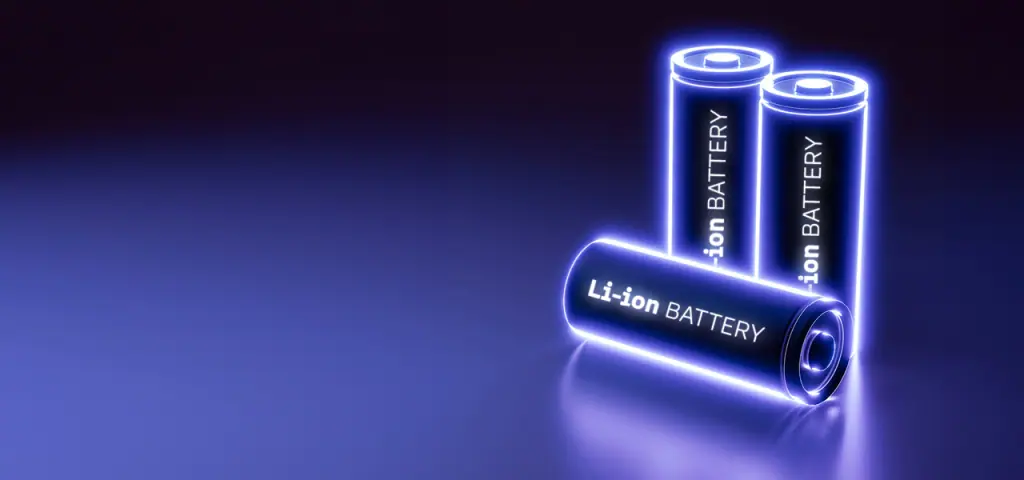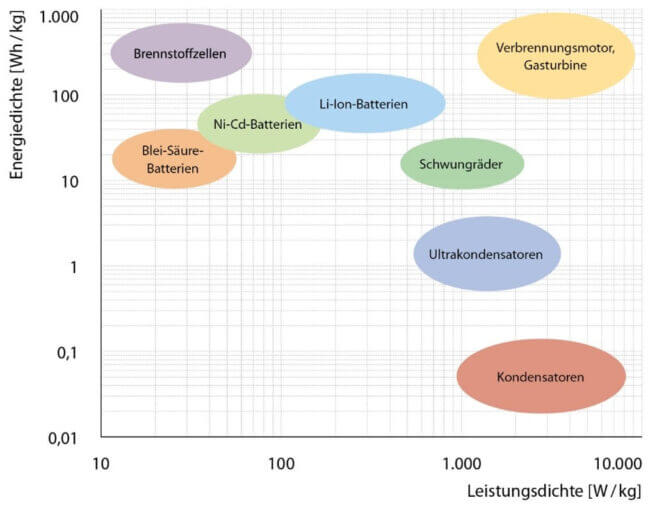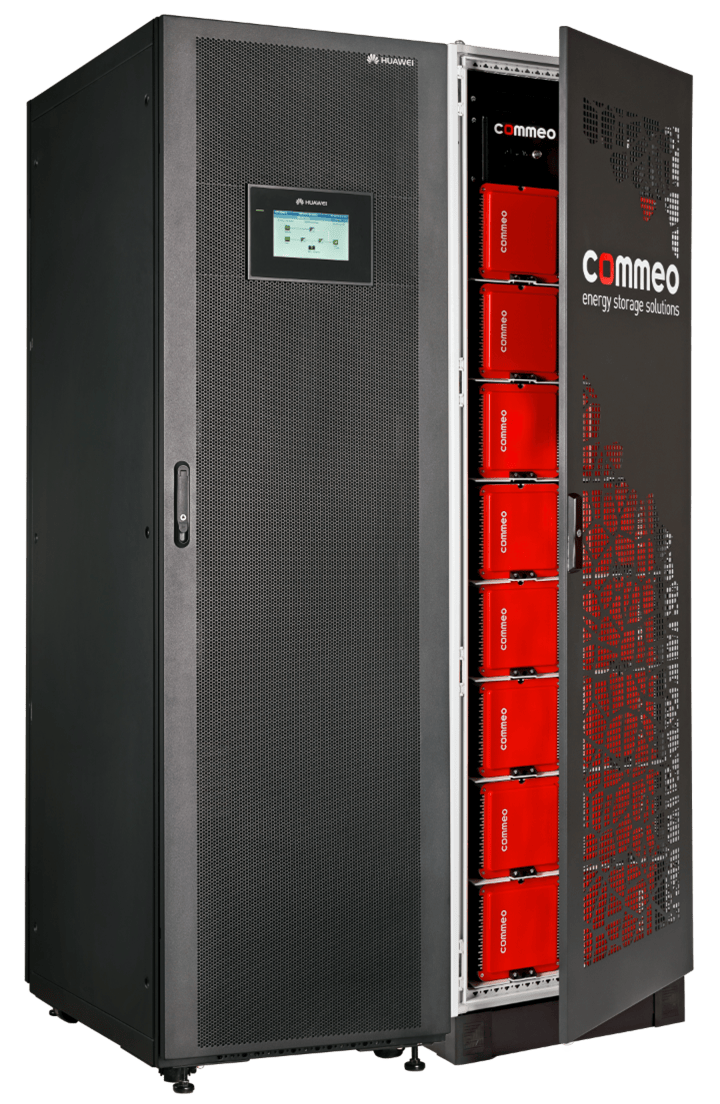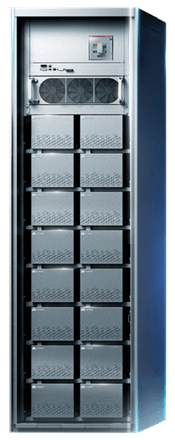Thinking about the future with Li-ion technology.

Technology is constantly advancing with the aim of increasing efficiency. For example, many of the latest generation of UPS systems have efficiencies of up to 97%. In contrast, however, hardly anything has changed in the last 30 years when it comes to energy storage systems for UPS systems. In most cases, the same lead-acid or VRLA batteries are still used as emergency power storage for the uninterruptible power supply. These also work perfectly. The batteries used to date do their job well: so why think about changing them?
Reduce operating costs and CO₂ emissions
VRLA batteries require an ambient temperature of 20 °C for optimum use and service life. Maintaining or achieving this temperature can be a challenge. For every 10 °C above the recommendation, the service life of a VRLA battery is reduced by half. Li-ion batteries are not as sensitive to heat or cold. Against this background, this type of energy storage is particularly interesting for data centers.
The ambient temperature requirements for Li-ion batteries are more modest compared to lead batteries. Elevated temperatures have significantly less impact on the service life of a Li-ion battery. If the energy storage system can be used for longer, this has an impact on the cost structure. For example, data centers can dispense with air conditioning completely or to a lesser extent. This not only reduces power consumption, but also costs and CO₂ emissions.
Space saving thanks to lithium batteries
Saving space is another advantage of the Li-ion battery. For most data centers, lack of space is not a problem when it comes to accommodating lead-acid batteries. However, when it comes to expansion, space can become a scarce commodity. Li-ion batteries require only a third of the volume of an equivalent VRLA block and weigh only a quarter of it. This space saving offers a decisive advantage, especially for small, regional edge data centers.
But aren't lithium-ion batteries expensive?
Why haven't we switched to Li-ion batteries long ago if the advantages outweigh the disadvantages? Until now, the high purchase costs have been an argument against switching. However, thanks to further development, especially in the automotive industry, prices have fallen significantly in recent years. Even today, the purchase of a Li-ion battery is still more expensive than a lead-acid battery. However, if the double service life and the lower energy costs are taken into account, the investment pays for itself again. In comparison, even lead-acid batteries designed to last 10 years are replaced every 7 to 8 years. Li-ion batteries, on the other hand, are designed to last 13-15 years. Despite the higher initial investment, the change is worthwhile in the long term.
Is Li-ion technology also safe?
In addition to the acquisition costs, security concerns also spoke against the change in the past. In the meantime, however, the technology has advanced. The management and testing of Li-ion batteries is covered by the IEC62619 standard. This was specifically designed for the control systems of industrial batteries and was introduced over two years ago.
Li-ion batteries are more susceptible; oxygen can be released during the charging process at high temperatures due to overcharging. A battery management system (BMS) is therefore required in accordance with IEC62619. This prevents the organic liquid electrolyte from becoming too hot due to overcharging or undercharging. The BMS issues a warning if the safe voltage range is exceeded and the compatible UPS system can respond. If this is ignored, a 2nd level alarm is connected to a circuit breaker to prevent further charging or discharging of the cell. This dual level of protection must be implemented and tested to meet the requirements of the IEC62619 standard.
Every battery, including lead-acid batteries, is a potential hazard. However, correct handling minimizes the risk. Current Li-ion technology is now so safe that it is used in data centers and other facilities that are considered critical infrastructure.
Types of Li-ion batteries
Li-ion batteries are available in different types of materials, the most common of which are:
- NCM
- LCO
- LMO
- LFP
The material used must be highly stable in any state of aggregation. The safest and most reliable is LFP, as no oxygen is released during the decomposition of LFP, which drastically reduces the risk of explosion.

What will the future bring?
There is no question that lithium-ion batteries will be increasingly used for UPS systems in the near future. However, the UPS system and lithium-ion technology must be compatible. Wöhrle Stromversorgungssysteme GmbH ensures this compatibility - our technology can communicate with the battery monitoring system of lithium-ion batteries.
Currently, developing countries such as Africa and the Middle East are primarily relying on lithium-ion technology for UPS systems. Countries where the main power grid is less reliable than in Central European countries. Due to an unreliable main power grid, power outages are almost a daily occurrence. In these cases, UPS systems have to intervene several times a day to ensure an uninterrupted power supply. The increased use of Li-ion batteries does not put additional strain on the emergency power storage system. This type of battery copes with the constant on/off cycle much better than VRLA technology.
Wöhrle perfectly matches its lithium-ion energy storage systems to its UPS systems. This is the only way to create a harmonious unit. Our design enables uncomplicated integration into standard industrial or IT racks. A storage solution tailored to the customer can be individually adapted and configured to meet every need, resulting in a customized solution that is precisely tailored to the customer's needs.


